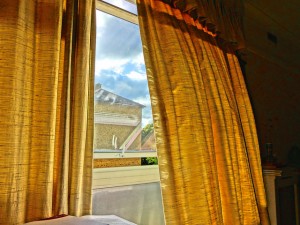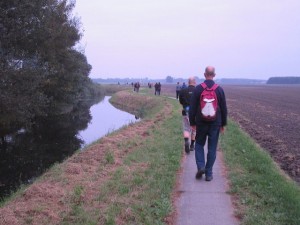1. draught/draft ![]()
[noun]
[de tocht, <no plural>]
 “Tocht” is the suction of the wind in a room when you for example open windows on opposite sides. The verb is ‘tochten’. A common expression is ‘op de tocht komen te staan’, see below.
“Tocht” is the suction of the wind in a room when you for example open windows on opposite sides. The verb is ‘tochten’. A common expression is ‘op de tocht komen te staan’, see below.
(Photo: Julie Kertesz (flickr.com) – some rights reserved.)
Examples:
– “Mijn moeder kan niet tegen tocht, dan krijgt ze last van haar gewrichten weet je wel…”
(“My mother can’t stand draught/draft, her joints start to bother her you know…”)
– “Er ligt overal stof in huis, ik word er gek van!” – “Tja, dat krijg je met die tocht!”
(“There’s dust everywhere in the house, it’s driving me crazy!” – “What can I say, that’s what you get with all that draught/draft.”)
– “Tocht is wind in huis, maar wind in huis hoeft niet altijd tocht te zijn.”
(“Draught/draft is wind in your home, but wind in your home does not necessarily have to be draught/draft.” Quote by “Frits van Egters”, main character in the famous Dutch book “De Avonden” by Gerard Reve.)
Expressions:
– “Op de tocht zitten”: to sit in a draught.
– “Op de tocht (komen te) staan”: to be put at risk, to be in the balance.
Example:
– “Door de bezuinigingen komen veel banen op de tocht te staan.”
(“Due to the cutbacks many jobs will be put at risk.”)
Related words:
– Tochten: to be draughty/drafty, to let the wind through (a room) [verb] [tochtte, getocht].
Example:
– “Het tocht hier!” – “Doe het raam dan dicht als je er last van hebt!”
(“There’s a draught here!” – “Well then, close the window if it bothers you!”)
– Tochtig: draughty/drafty [adjective]. You can also talk about a ‘tochtige koe’: a cow in heat.
– Tochtgat: blowhole, draughty/drafty spot [noun] [het tochtgat, de tochtgaten].
– Wind: wind [noun] [de wind].
2. journey, trip, outing ![]()
[noun]
[de tocht, de toch-ten]
 “Tocht” can also be used for ‘journey’ or ‘trip’. Duration of the ‘tocht’ should be clear from context, a ‘tochtje’ is a short trip like an outing. A ‘dagtocht(je)’ is an outing for the day.
“Tocht” can also be used for ‘journey’ or ‘trip’. Duration of the ‘tocht’ should be clear from context, a ‘tochtje’ is a short trip like an outing. A ‘dagtocht(je)’ is an outing for the day.
(Photo: Henk-Jan van der Klis (flickr.com) – some rights reserved.)
Examples:
– “Na een barre tocht door de bergen, kwamen de vluchtelingen aan in het kamp.”
(“After a tough journey through the mountains, the refugees arrived in the camp.”)
– “Hoe was het museum?” – “Fantastisch! Echt een tocht door de eeuwen heen!”
(“How was the museum?” – “Fantastic! Truly a journey through the centuries!”)
Expressions:
– “Een (dag)tochtje maken”: to go on an (day) outing. You can also use this expression (without the ‘dag’) to say that you are going for a ride, but it would be a longer ride than just around the block.
Example:
– “Wat hebben jullie zaterdag gedaan?” – “We hebben een dagtochtje gemaakt naar de Zaanse Schans.”
(“What did you do on Saturday?” – “We went on an outing for the day to the Zaanse Schans.”)
Related words:
– Uitje: outing [noun] [het uitje, de uitjes]. Here you can also say ‘een uitje maken’: to go on an outing.
– Reizen: to travel [verb] [reisde, gereisd].
– Reisje: short trip [noun] [het reisje, de reisjes].

For the joy of commenting on my post, a few related words came to my mind:
– Intocht: entry/entrance. Usually ceremonial, somebody arriving in say a town. For example: “De intocht van Sinterklaas.”;
– Optocht: procession, march.
– In aantocht zijn: arriving soon, to be on the way. For example: “Ik vind het maar koud buiten!” – “Tja, wat wil je, de winter is in aantocht!”